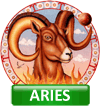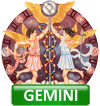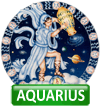Element: Air.
Stones : Emerald, topaz, heliotrope, jasper, amethyst, lilac sapphire, apatite, citrine, serpentine, malachite, chalcedony.
Metal: Lead.
Day: Wednesday.
Color: Green, light green.
Direction: North.
Influence: Third and Sixth House.
Abode: Virgo, Gemini.
Exaltation: Aquarius.
Detriment: Pisces, Sagittarius.
Fall: Leo.
Friendly planets: Sun, Venus.
Hostile planet: Moon.
Strong Mercury: Buisness acumen, mathematical mindset, high position.
Afflicted Mercury: Irritability and arrogance.
Organs: Arms, shoulders, skin, peripheral nervous system.
Diseases: Dizziness, nervous disorders, skin problems.
Orbital period in one sign / whole zodiac: 25 days / 10 months.
Map legend: E
Close proximity to the Sun defines the character of this small but charismatic planet. Its main functions are: reasoning, logical thinking, cognition, and communication between the individual and society.
If a native shows curiosity and a keen interest in knowledge from childhood, Mercury will readily reveal just how vast and amazing the world around them is.
In essence, Mercury represents the principles of rational thinking, speech, contact, mediation, interaction, learning, and exchange. In the natal chart, Mercury symbolizes the native’s type of thinking, consciousness, curiosity, intellectual aspirations, ability to communicate and learn, liveliness, and dexterity.
Keywords: communication, correspondence, news, acquaintances, curiosity, thought, openness, spontaneity, eclecticism in choice, diffuseness, youth, short trips, siblings, relatives, transportation, primary education, voice, oratory, writing, gossip, rumors, diplomatic skills, technology, tests, data processing, employees, skill, dexterity, criticism, lies, deception.
Mercury rules the signs of Virgo and Gemini, which are associated with communication, transportation, vehicles, computers, illness, and work that requires attention to detail. In social terms, Mercury symbolizes a teenager or young person (regardless of gender), a younger sibling, neighbors, a pickpocket, swindler, cheat, merchant, salesperson, scientist, or teacher.
Mercurial professions include trade, publishing, mediation, librarianship, journalism, literary work, secretarial duties, accounting, communication, engineering, computer programming, invention, tour guiding, and professions requiring dexterity and skill (for example, circus acts such as balancing and juggling), as well as intellectual professions. Parts of the body ruled by Mercury: the nervous system (especially motor nerves), the organs of vision and the senses in general, mouth, tongue and speech organs, larynx, trachea, shoulders, arms, hands and fingers, navel, solar plexus, ligaments and tendons, and the small intestine.
The sphere of influence of this planet includes theThird and Sixth Houses.
The Third House personifies self-expression in the native’s everyday environment: the way a person expresses their thoughts in oral and written speech, and communicates with both household members and strangers, for example, with fellow travelers in transit.
The Sixth House corresponds to health, social duty, and relationships of service.
In the field of physiology, Mercury primarily influences the five senses, as well as the nervous and autonomic systems.
Public duty, in this context, refers to helping others. This can involve charity or volunteer work.
In the business sphere, Mercury governs relationships between coworkers, superiors, and subordinates.
Preferred professions associated with Mercury include journalism, teaching, publishing, trade, and service work.
Principle
Traditionally, the most distinctive “character” trait of Mercury is the ability to establish connections and relationships. In mythology, Mercury (Hermes) is described as the mediator between Olympus and Earth, the messenger of the gods, linking their world with that of humans by transmitting information—delivering commands from the gods to people and requests from people to the gods.
In other words, Mercury connects systems and processes at various levels of the hierarchy. For example, the planet gives continuous information a discrete form (expressing images in words and symbols—analysis and thought), and defines interactions such as boss–subordinate, human–organism (hygiene), organism–organs (diseases), or teacher–student.
Functions
The realization of Mercury’s principle—the relationship between wholes at various levels of the hierarchy—requires the establishment of connections between them. This, in turn, demands precisely those qualities traditionally symbolized by Mercury: rational thinking, the ability to create mental constructs, gather information, formulate thoughts, distinguish the essential from the secondary, the willingness and capacity to understand others, as well as activity and mediation skills.
These qualities are expressed in different ways depending on the specific task—whether in science or business, journalism or biology, or in interactions between people. Regardless of the context in which they are manifested, they are always directed toward establishing connections and facilitating the exchange of information or material values, as well as coordinating the efforts of various entities to solve such problems.
Role
The principle of Mercury encourages the native to seek an adequate way of expressing the creative Solar principle, to gather a wide variety of facts—each equally significant—while deliberately avoiding evaluation or generalization. The aim is to later integrate this information into a system and to share these discoveries, making them common knowledge.
The role of Mercury most closely corresponds to that of an intermediary. However, it is important to remember that the mediator, in this context—as with the definitions of the principles, functions, and roles of the other planets—is a symbolic representation of Mercury’s role.
Strong Mercury
Harmonious aspects enhance the activity of thought, lend vividness and originality to intellectual abilities, and provide the native with brilliant wit and an excellent sense of humor.
A person with a strong Mercury is well versed in understanding people. The native clearly knows what they want from life and how to achieve it.
Afflicted Mercury
When Mercury is afflicted, a native’s life may be overshadowed by speech defects, nervous disorders, or an inability to express thoughts in a simple and understandable way.
Character traits may include deceitfulness and inconsistency in love. There may also be a tendency toward kleptomania.
The most serious health risk is schizophrenia.
Harmonious Aspects
During school and university years, the native demonstrates a sincere interest in learning, which lays the foundation for future achievements.
The ability to express thoughts in beautiful words can develop into a strong literary talent. Successful self-realization is also possible in other creative fields. Many diplomats and scientists are found among those with harmonious Mercury aspects.
Such aspects indicate sound judgment. The native is endowed with the ability to make contact easily and usually has many friends.
Another positive trait is success with the opposite sex. However, becoming overly focused on this area of life can seriously impede career growth.
The main danger is laziness. If the native succumbs to it, even a gifted and extraordinary person may become a frivolous hedonist.
Tense Aspects
Tense aspects define the range of challenges the native needs to address. These may include communication difficulties, learning obstacles, or disharmonious patterns of speech.
The main obstacle to happiness and success is a distorted perception of reality. A tendency toward biting or sarcastic remarks can also cause significant trouble. A sharp tongue may lead to resentment among household members, alienation of friends, and hostility from superiors and colleagues.
Recognizing one’s own shortcomings is often hindered by a sense of superiority over others, as well as by skepticism. The native may sometimes use their potential only for selfish purposes.
However, tense aspects signify more than just problems—they also show the way to overcome them. If necessary, the native should work on improving their speech. If the public does not want to listen to what the native believes is an “amazing” story, it is important to make an effort and acknowledge that the story may not be as good as initially thought. It is also beneficial to raise one’s educational level, read more books, and improve writing skills.
In general, overcoming the negative influences of tense aspects requires leaving behind old patterns of behavior and learning to listen to others and respect their point of view. ✓
| ASPECTS | PLANETS |
CONJUNCTION (0 °) |
Mercury – Sun |
| Mercury – Moon | |
| Mercury – Venus | |
| Mercury – Mars | |
| Mercury – Jupiter | |
| Mercury – Saturn | |
| Mercury – Neptune | |
| Mercury – Pluto | |
| Mercury – Uranus | |
| Mercury – Ascendant | |
| ASPECTS | PLANETS |
SEXTILE (60 °)
|
Mercury – Moon |
| Mercury – Venus | |
| Mercury – Mars | |
| Mercury – Jupiter | |
| Mercury – Saturn | |
| Mercury – Uranus | |
| Mercury – Neptune | |
| Mercury – Pluto | |
| Mercury – Ascendant |
| ASPECTS | PLANETS |
SQUARE (90 °) |
Mercury – Moon |
| Mercury – Mars | |
| Mercury – Jupiter | |
| Mercury – Saturn | |
| Mercury – Pluto | |
| Mercury – Neptune | |
| Mercury – Uranus | |
| Mercury – Ascendant |
| ASPECTS | PLANETS |
TRINE (120 °) |
Mercury – Moon |
| Mercury – Mars | |
| Mercury – Jupiter | |
| Mercury – Saturn | |
| Mercury – Neptune | |
| Mercury – Uranus | |
| Mercury – Pluto | |
| Mercury – Ascendant |
| ASPECTS | PLANETS |
OPPOSITION (180 °)
|
Mercury – Moon |
| Mercury – Jupiter | |
| Mercury – Mars | |
| Mercury – Saturn | |
| Mercury – Neptune | |
| Mercury – Uranus | |
| Mercury – Pluto | |
| Mercury – Ascendant | |
Share with your friends. +5 to Karma
Articles from the category:
























Comments: